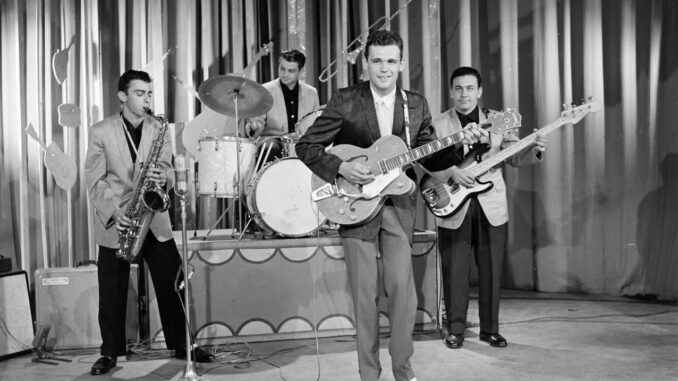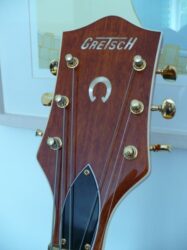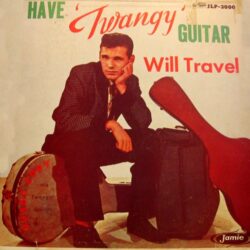
It Don’t Mean a Thang If It Ain’t Got That Twang.
Duane Eddy was popularly known as the “King of Twang” for his reverb-drenched, staccato style of playing guitar. He had an outsized influence on how rock, rockabilly and even country guitar developed. The resonant melodic riffs he coaxed from the bass string on his famous Gretcsch 6120 electric guitar were unlike anything heard before, and have been cited by famous guitarists, including John Fogerty, Jimmy Page and Jeff Beck, as the catalyst for them to master their chosen instrument. Page wrote on Instagram that, “Duane Eddy twanged the thang in the late 50s and 60s, and you can hear his character sound appearing throughout the decades of popular music.”

Eddy died in a hospital on April 30, 2024 in Franklin, Tennessee. He was 86. The cause of his death was complications of cancer said his wife, Deed (Abbate) Eddy. He is survived by three children from his first marriage, five grandchildren and nine great-grandchildren.
You can plug in any accolade you wish and it will likely ring true. He was a virtuoso, a Hall of Fame legend and as Fogerty said: “Duane Eddy was the front guy, the first rock and roll guitar god.”
Duane Jerome Eddy was born in 1938 in Corning, New York. His father drove a bread truck for a living, and his mother was a housewife. At five years of age, Eddy started playing guitar. Inspired by the singing cowboys like Gene Autry and Roy Rodgers that he heard on the radio, young Duane reckoned his destiny was to play the electric guitar. When he turned 13, his parents moved to Tucson, Arizona where he began a partnership with Lee Hazelwood.
Eddy enrolled in high school and met Jimmy Delbridge, who had heard him play a Chet Atkins tune on the radio station’s early morning farm hour. His dad managed the Safeway supermarket and talked a local DJ into putting young Duane on the air. “Jimmy came running up to me and said, ‘You want to play some music at my house?’” He and Delbridge formed a country duo, Jimmy & Duane. Eddy sang and played guitar while Delbridge harmonized and played piano. The DJ, Jim Doyle, had them record two songs. Hazelwood heard those and released a single on his own label.
Meanwhile, Jimmy and Duane were making trips to Phoenix to play the Arizona Hayride shows at the Arizona version of Madison Square Garden, which Eddy thought a bit presumptuous. In an article in the “Arizona Republic,” Eddy recalled, “We weren’t but a bunch of desert rats. I guess they don’t care. They like to be grand about things. Anyway, we’d play on the stage, which was a wrestling ring. And we had to be careful. If you stomped too hard, the reverb in our amps would crackle and go bang.”
This was in the early days of multitrack recording, and Hazelwood was trying to find the perfect distinctive sound for Eddy. They finally hit upon the idea that would produce his signature twangy sound. This was achieved by recording his guitar’s bass strings while playing lead lines in a large water tank.
Eddy told the story in “Guitarist” magazine: “Our echo chamber was actually a 2,000-gallon water tank. We went down to the Salt River and visited a junkyard there. Floyd Ramsey, who owned the studio, Jack Miller, the engineer, and Lee and I went round the place, and we yelled into tanks that might work as a reverb chamber – they had holes at each end. Lee would go, ‘Whoop!’ and he got an echo out of them.”
Hazelwood produced a chain of hits on the Jamie Records label for Eddy, which were noted for their characteristically twang sound, including ‘Rebel-‘Rouser,’ ‘Peter Gunn,’ and ‘Because They’re Young.’ That signature sound was later used for Nancy Sinatra’s ‘These Boots Are Made for Walkin’,’ and the Beach Boys adopted the opening riff for ‘Surfin’ USA.’
 His breakthrough hit song was ‘Rebel Rouser,’ which featured an overdubbed saxophone by Gil Bernal, and yells and handclaps by doo-wop group the Rivingtons. His backing band was the Rebels, which included Al Casey (guitar), saxophonists Jim Horn and Plas Johnson, and Larry Knechtel on keys and bass.
His breakthrough hit song was ‘Rebel Rouser,’ which featured an overdubbed saxophone by Gil Bernal, and yells and handclaps by doo-wop group the Rivingtons. His backing band was the Rebels, which included Al Casey (guitar), saxophonists Jim Horn and Plas Johnson, and Larry Knechtel on keys and bass.
The song was actually the B-side to the tune ‘Stalkin’ until Dick Clark happened to hear it and put ‘Rebel Rouser’ into regular rotation on the iconic TV show, “American Bandstand.” It reached number 6 on the Billboard Hot 100 chart and sold over one million copies, earning Eddy his first gold disc. He sold millions of records after that but never had a song make it to number one.
By the mid-‘60s, interest in Eddy’s music began to wane as people were seduced by the British Invasion, psychedelic sounds from San Francisco and folk music protesting the Vietnam War. There was a rockabilly revival of sorts in the ‘70s, leading to a renewed interest in his music. ‘The Ballad of Paladin’ was used as the theme song for the hit TV series “Have Gun Will Travel.” He produced albums by Phil Everly and Waylon Jennings, and married Jesse Colter (Jennings’ widow), his second of four wives.
Though he faded into the background of rock ‘n roll as the years went by, Eddy continued to be an inspiration to other guitarists such as George Harrison and Peter Frampton. Bruce Springsteen said on an Instagram video, “Duane was a huge influence on my guitar stylings and without Duane there’s no ‘Born to Run’ riff.”
In the ‘90s, Eddy’s songs were featured in major motion pictures like “Natural Born Killers” (1994), “Forrest Gump” (1994) and “Broken Arrow” (1996). In 1994, he was inducted into the Rock ‘n Roll Hall of Fame and received a lifetime achievement award from the Country Music Hall of Fame.
Kyle Young, the director of the CMHOF said that Eddy’s electric guitar was “a voice all its own” and that his style inspired thousands of musicians. “His sound was muscular and masculine, twangy and tough. Duane scored more than thirty hits on the pop charts. But more importantly, his style inspired thousands of hillbilly cats and downtown rockers — The Ventures, George Harrison, Steve Earle, Bruce Springsteen, Marty Stuart, to name a few — to learn how to rumble and move people to their core. The Duane Eddy sound will forever be stitched into the fabric of country and rock & roll.”
Eddy continued making music sporadically into the new millennium, recording an album (“Road Trip”) in 2011 and playing a series of shows in the UK backed by Richard Hawley’s band.
In a 2013 interview with “Guitar Player” magazine, which had presented him with its Legends Award, he spoke of his methods for making records. “For me, it’s not just playing the instrument, it’s also making the record. I guess a better way of explaining it is that I don’t write or arrange songs as such. Instead, I think of it as writing or arranging records. My sound is the common denominator that pulls all the threads and knits them together.”

Duane Eddy was arguably the most important rock ‘n’ roll instrumentalist ever. Joe Bonamassa, who knows a thing or two about playing instrumental guitar, said he was “a true pioneer and bona fide legend.”
He often would downplay his influence on rock music, making jokes about his main contribution being that he didn’t sing on his records. “I never felt that I had a good voice for singing,” he said. “When I was young, this frustrated me a lot, so I took it out on the guitar.”
I don’t imagine Duane Eddy’s contributions to keeping the raunchy spirit of rock ‘n roll alive and kicking when it was in danger of being watered down by pop music. His innovative techniques and twangy sound will be greatly missed.



Duane Eddy’s guitar sound is a foundational component of Richard Hawley’s solo career. Hawley also produced Eddy’s final album, “Road Trip”, back in 2011.